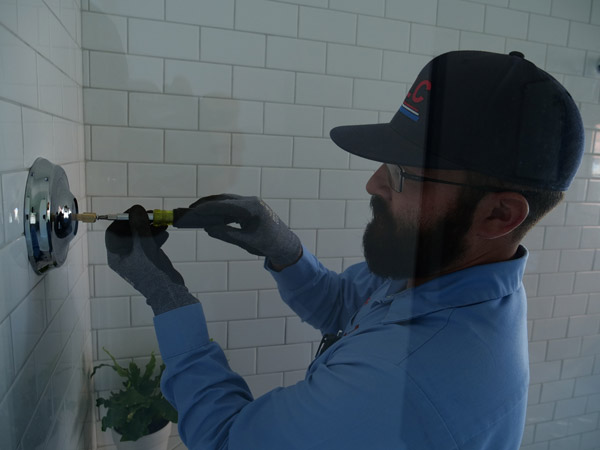A shower leak happens when the shower head or faucet drips constantly or worse, won’t turn off at all! A shower faucet replacement doesn’t look complicated at first glance, but it often is. Here are the answers to seven frequently asked questions about shower faucet leaks:
1. Why is my shower leaking?
According to our TLC plumber Shannon, about 90% of shower leaks that are coming directly from the shower faucet or shower head are because of a failed cartridge. The cartridge is responsible for stopping and starting the flow of water through the faucet. For minor damage, you can simply replace the cartridge.
If the valve has been compromised by hard water, the whole thing will need to be replaced. That means the shower head and all the hardware behind it. Unfortunately, this means tearing into the wall behind the shower faucet. This is simpler if there’s a hallway or a closet on the other side of the shower. When there isn’t, the plumber goes through the tub, which is more difficult and more costly.
Do you have a leaky shower? Schedule an appointment today.
2. How do you fix a shower that won’t turn off?
If your shower faucet or shower head won’t turn off, find your home’s main water shut off. In some houses, it’s located in a bathroom under the sink. You can also check in the garage or near your water heater. If you can’t find it in your home, shut off the water at the street. Once you’ve done this, call a plumber right away.
Why did your shower get stuck with the water on? A shower faucet that won’t turn off is caused by full cartridge failure. For single-handle faucets, it often happens because the seals in the cartridge become compromised. They bind up, and it gets stuck in the “on” position. If this happens, the valve needs to be replaced.
3. Can I replace a shower valve myself?
We don’t suggest replacing the shower valve yourself. It requires special tools to remove it. Otherwise, you risk causing more damage. Extra damage can as much as quadruple the cost of the repair if you call a plumber later. An expert plumber will make it look simple and easy because of their tools and expertise, but it’s not. If your shower is leaking, call TLC to schedule a plumber.
If the water leak’s not coming from the handles or the sprayer, but from underneath the faucet base itself, it’s time to replace the faucet. This isn’t repairable because the small copper tubes inside are damaged.
4. How often should you replace a shower faucet?
This depends on how hard your water is, how much water you use, and the quality of the faucet. With soft water and a high-quality shower valve, it may be 20 years before you need a replacement. Some shower faucets only last about five years.
5. Are shower faucets universal or interchangeable?
No, shower faucets are not universal or interchangeable. They are brand specific. Many people buy a shower faucet because of how it looks, not realizing that it may not be compatible with their plumbing. Avoid aftermarket universal handles and faucets because they often cause issues later. Check with your plumber before purchasing a new shower faucet.
6. Can you replace just a shower handle?
Yes, you can replace just the handle in your shower. Keep in mind that if the cartridge or the valve is the problem, this might not solve anything. Your plumber will help you decide the best course of action for your situation.
7. Can you replace a shower faucet without replacing the valve?
No, you cannot replace the shower faucet without replacing the valve. This is a bit of a trick question because the shower faucet and the valve are the same piece of equipment. Replacing the valve is replacing the faucet and all the hardware associated with it.
The bottom line is…
Shower faucet repairs are not always simple, but they can be if they’re caught early on. Keep an eye out for those drippy faucets and stiff handles. If you need help with your shower, you can schedule an expert TLC plumber today!

